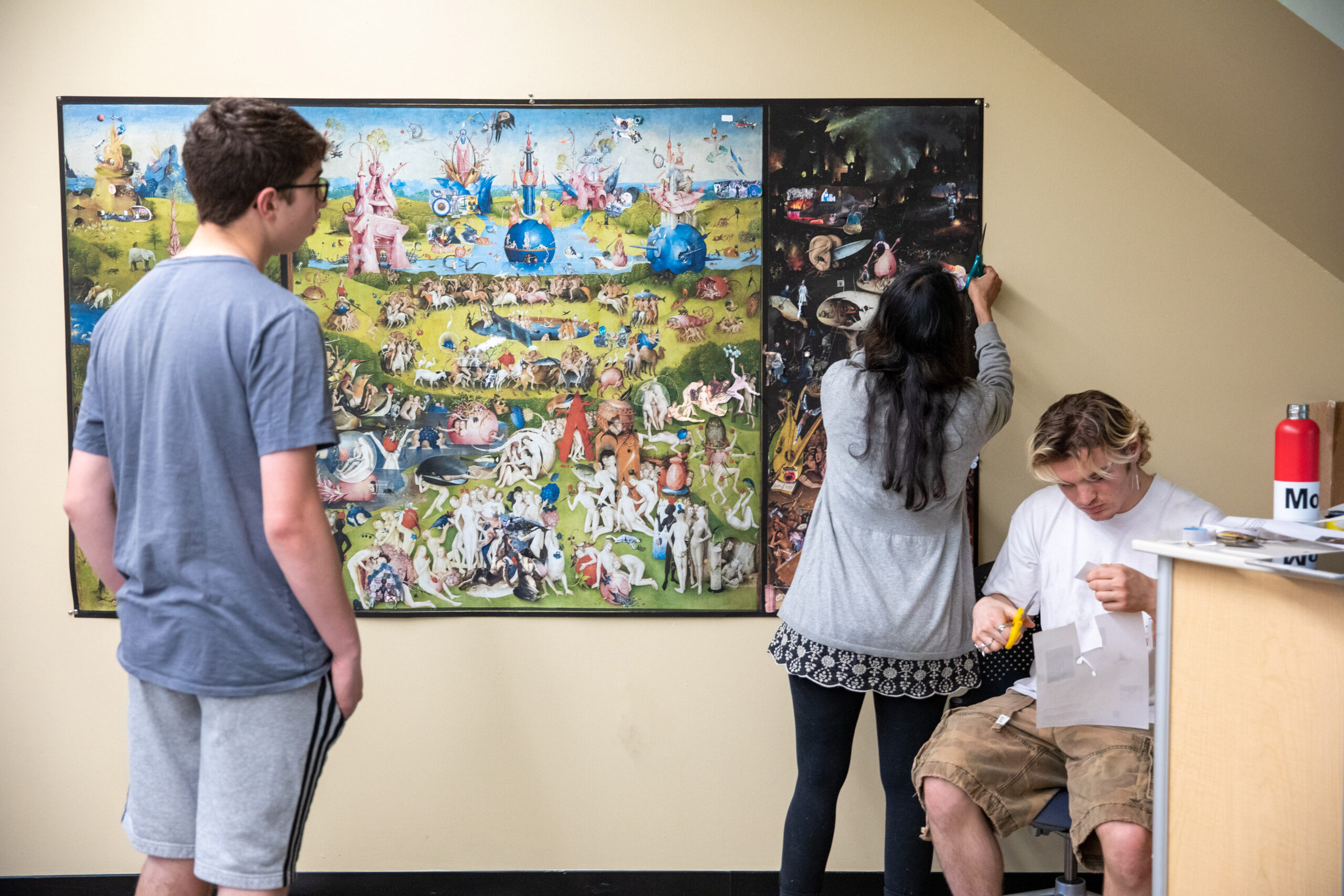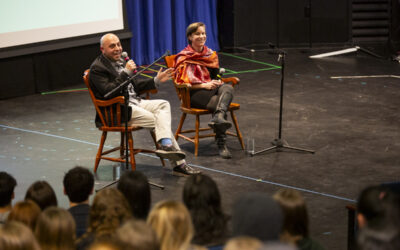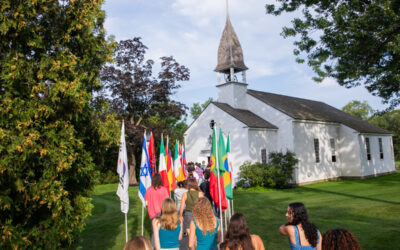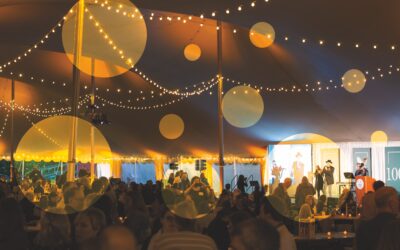
In both popular culture and today’s ceaseless news cycle, there’s no shortage of scenarios for how the world might end, whether through climate catastrophe or artificial intelligence. In some ways, this isn’t new. “Humans have faced the apocalypse since time immemorial,” says history teacher Topi Dasgupta P’22 ’25. “The destruction of major civilizations has occurred throughout history, but with the collapse of complex systems, what we’re facing now is on a planetary scale.”
How might we turn toward these crises without the safety of satire, the distance of cynicism, or the disembodiment of doomscrolling? What meaning might students make from this cultural moment? These are some of the questions that animated an experimental class at Concord Academy this spring, which Dasgupta and English teacher Laurence Vanleynseele P’22 co-taught, thanks to faculty support from CA’s endowed Department X initiative.
The course, titled Apocalypse, Whatever: Caring in the Age of Post-Truth, examined the language and cultural assumptions that have contributed to a present-day sense of unreality. Students engaged with the works of historians, cultural theorists, and a variety of artists, novelists, and filmmakers. The class read works by writers Jorge Luis Borges and Patricia Lockwood as well as philosophers such as Hannah Arendt and Byung-Chul Han. Dasgupta and Vanleynseele set canonical texts such as Plato’s “Allegory of the Cave” and Shakespeare’s The Tempest in conversation with contemporary works, such as James Bridle’s The New Dark Age: Technology and the End of the World and Tim Morton’s Ecology Without Nature.
The teachers embraced an emerging, responsive syllabus, or as Vanleynseele calls it, “a genuinely ongoing process of adaptation and collective discovery.” She and Dasgupta would read articles in the news and follow footnotes down rabbit holes. In the evenings, they’d call each other to suggest adding an essay just published in The Atlantic and pairing it with a course text. They also encouraged students to navigate other media: TED Talks, documentaries, even a Bo Burnham comedy special.
“Usually, when I teach a course, there is always an element of the unknown and the fun of it is to follow the students’ lead, to react as a community to the material,” Vanleynseele says, “but things are rarely as fluid, as spontaneous, as they were in this course.”
Dasgupta and Vanleynsee credit the genesis of Apocalypse, Whatever to their long-standing relationship and a natural, and familial, convergence of interests. Over many years of teaching, living, and parenting together at Concord Academy, Vanleynseele says she and Dasgupta talked often about the ideas that had felt transformative in their own educations and how the promises of Western liberalism and theories that heralded “resistance against oppression” had “lost their currency or been twisted or hollowed out on both sides of the political spectrum.”
But it was a departmental study Vanleynseele’s daughter, Zoé Green ’22, arranged with Dasgupta to better understand what brings about social change that set the wheels in motion. Green, who had previously taken Dasgupta’s history of philosophy class, focused on the climate crisis and the ways that scientific language hadn’t catalyzed sufficient collective action.
“Though the reality of the climate catastrophe was something that I had thought about a great deal, to be honest, at some point I felt so overwhelmed by the enormity of it that I consciously avoided all news about it,” Vanleynseele says. “But once she put it like that, it felt obvious that we needed to offer a course explicitly about these issues.” The teachers began doing research while pulling together a Department X proposal.
They did not set out to alarm students who might already have felt discouraged and depressed. “Some distance is warranted in that respect; it can actually help us think better and care about life and each other despite the difficult circumstances we find ourselves in,” Vanleynseele says. They attempted, instead, to diagnose the present moment, looking back at history while avoiding offering solutions.
“If we are faced with a problem of consciousness, a problem with thinking, I told students, then what I can offer is to think together and reflect on what consciousness is, on how language operates, for instance, on how various systems connect with each other,” Vanleynseele says. “You cannot tackle a problem that you do not understand, so my goal was less to light a fire under us and more to examine why we are at a crisis point and why many of us feel paralyzed or disengaged in the face of the crisis’ enormity.”
She admits to wondering, during the preliminary research stages, if they had made the right choice to offer the course. But her research and discussions with students renewed her appreciation for artists and intellectuals who help us see from different vantage points. Navigating these crises with students who are just beginning their adult lives, she says, gave her “a real sense of purpose” and reinforced “the need for teaching about interconnected systems, undoing disciplinary silos, and the false dichotomy between thinking and activism.”
Dasgupta says her goal was for students to “end the course with good questions and not feel numb and turned off,” for them to “be engaged in the world and consider what a good future might look like.”
This orientation left room for optimism, and the class ended with a novel—Yoko Tawada’s Scattered All Over the Earth—that, Vanleynseele says, “affirms community and imagination and shows what resilience in the face of very real disasters may look like.”
“I went in expecting a much more depressing class than it turned out to be,” Cozette Weng ’23 says. “I was worried that it would be an echo chamber about how tough our world is, but I appreciated that Laurence pulled us back to the more intellectual side of things. It’s not that the world is ending, and not that it’s fine, but let’s think about how we’re thinking about it.” Her final project in Vanleynseele’s section was a hand-sewn historical recreation of a traditional Chinese robe, from a modernized pattern and fabric. Making and reflecting on it allowed her to question her notions of tradition.
For another final project in that section, Harry Carranza ’24 chose to create and record a fictional podcast, relating the sciences and the humanities. “At times the reading has been bleak,” he says, “but, personally, I feel more content knowing I have some vocabulary to deal with these issues, and some ability to think critically about them.”
For Emerson Koch ’24, taking the course with Dasgupta felt “like a real building of interconnected ideas”—something he would expect from a college class. “It’s what people are drawn to in Topi,” he adds. “She creates an environment where we consider these big ideas while she remains connected to each student, so it feels manageable.” For his part, exploring the topic of environmental crisis helped him more consciously engage with his individual environmental impact. He stopped driving to school and started exclusively taking the train.
Graylin Rhee ’24 found the course material introducing transhumanism, a movement advocating enhancing human capacities with emerging technologies, hard to get behind but interesting to learn about. “Personally, I haven’t really come to terms with where we are in the world right now, but I don’t really think that’s possible or even a good thing to do,” she says. “I do have a much better understanding of where we are.”
She and her classmates in Dasgupta’s section collectively assembled a collage as their final project, updating Hieronymus Bosch’s otherworldly and calamitous oil triptych “The Garden of Earthly Delights” with contemporary imagery informed by the semester’s discussions.
The teachers were surprised by what they learned alongside their students, particularly about artificial intelligence. “We knew, starting this course, that we did not fully understand our students’ interactions with technology—the generational gap is real,” Vanleynseele says. Learning about the communities some students inhabit online that give them a sense of common purpose was eye-opening, she adds: “I realize that I cannot continue to think of humanism without reflecting on these technological issues poised to change the way we interact with the world and each other.”
Dasgupta says she is grateful for the chance to bring this varied material together and to teach with Vanleynseele. “As an educator, I found this an incredible opportunity, because there’s such hunger in our students,” she says. “They feel this pressure—with war, the climate crisis, even just going off to college—and they hate being told that they’re the generation that has to fix it all.” Together, they faced that expectation, she says, by following “philosophical meanderings and considering what close reading means and why it’s important to understand historical methodology.”
Both teachers are collaborating on a paper about this course, which they hope to feature next year in the History Design Studio at Harvard. They also expect that much of what they explored will filter into other courses at CA. Vanleynseele was fascinated by a subfield she learned about while researching the course material: blue humanities, which reflects a collective scholarly shift of focus from land to the oceans that constitute so much of the globe. “Everyone who knows me knows how much I love teaching the Odyssey, so I welcome any opportunity to think of beloved texts anew,” she says.
She is excited to see how the threads are already being picked up across departments at CA, and to watch how they may weave together. “The issues of the course are not going away,” she says.
Department X is an initiative supported by the Faculty Leadership Endowed Fund, part of the Concord Academy Centennial Campaign. Created to provide CA teachers and staff with resources to develop new curricula, exchange ideas across disciplines, and create and seize opportunities for experiential learning, Department X funding allows recipients release time from their regular teaching schedules to pursue research projects and interdisciplinary endeavors.


